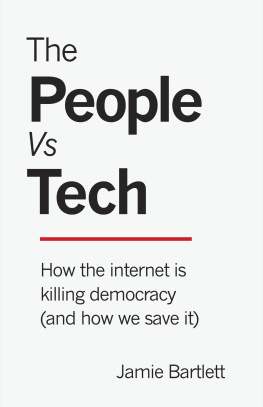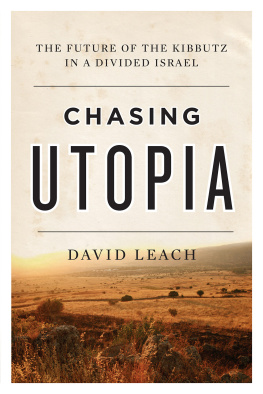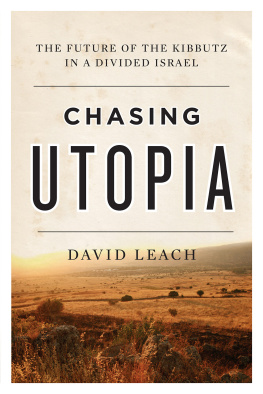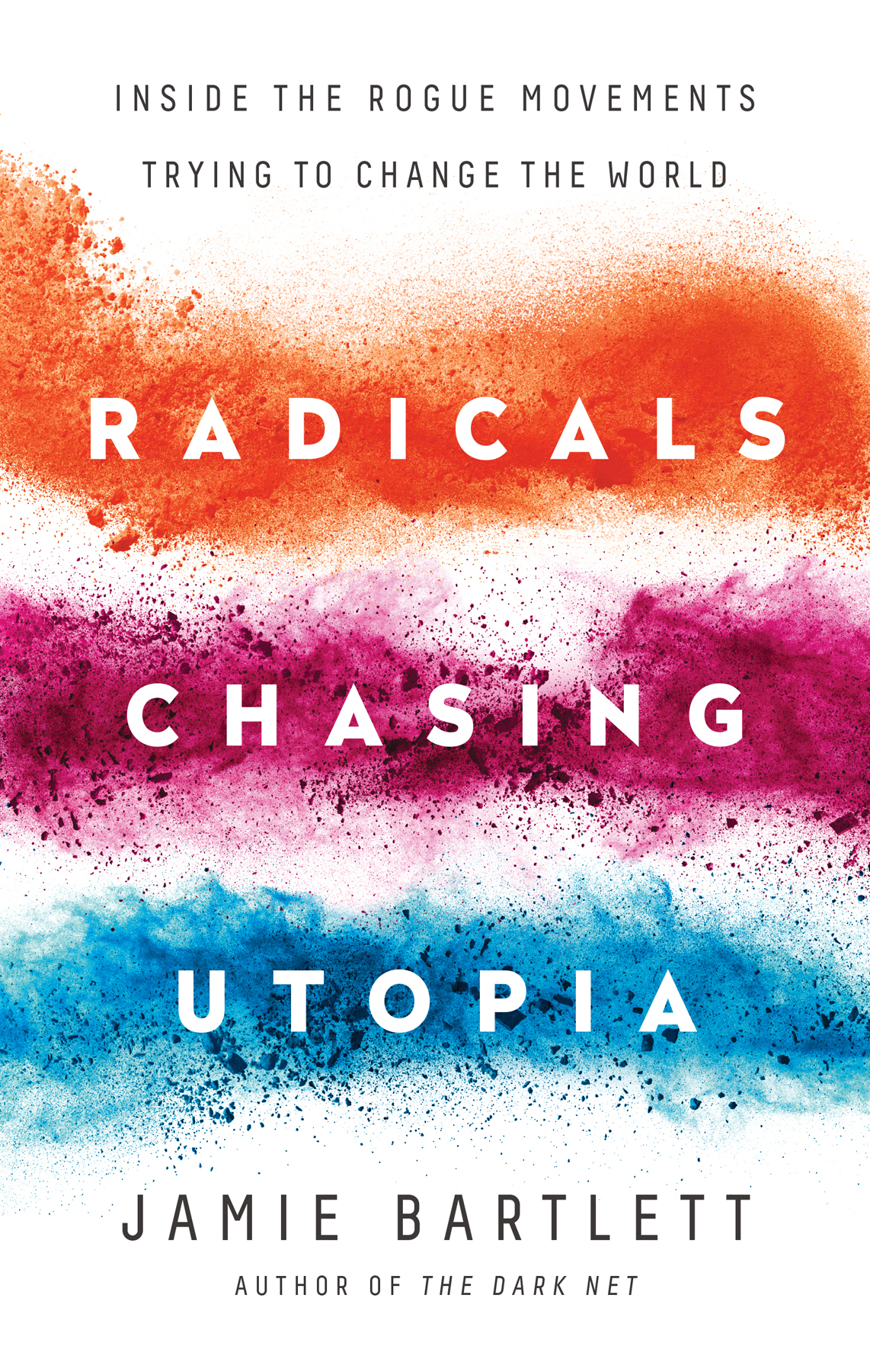Copyright 2017 by Jamie Bartlett.
Published in the United States by Nation Books, an imprint of Perseus Books, a division of PBG Publishing, LLC, a subsidiary of Hachette Book Group, Inc.
Nation Books is a co-publishing venture of the Nation Institute and the Perseus Books Group
All rights reserved. No part of this book may be reproduced in any manner whatsoever without written permission except in the case of brief quotations embodied in critical articles and reviews. For information, address the Perseus Books Group, 1290 Avenue of the Americas, New York, NY 10104.
The Hachette Speakers Bureau provides a wide range of authors for speaking events. To find out more, go to hachettespeakersbureau.com or call 866-376-6591.
A CIP catalog record for this book is available from the Library of Congress.
Its the hubris of every generation to think that they have arrived at the best way of living. That their laws, norms and conventions are natural, inevitable, even obvious.
But all the things we now take for granted, all the modern wisdoms we hold to be self-evident, were once derided as dangerous or foolish radical thinking. When the liberal philosopher and Member of Parliament John Stuart Mill sought to amend a clause in the 1867 Representation of the People Act from men to persons, it sparked a furious and mocking response. English masculinity would be threatened, said opponents. His proposed amendment would debase women. Mill was roundly defeated. Mr Mill might import a little more common sense into his arguments, said one member of parliament at the time.
Sixty years later, and thanks to the efforts of another group of radical campaignersthe Suffrage movementthe 1928 Representation of the People Act finally granted women equal voting rights to men in the United Kingdom. Anything else now seems as ridiculous and dangerous as Mills proposed amendment had appeared in 1867.
Thats not to mention the thousand smaller problems all bubbling under these megatrends: struggling public services, ageing populations, housing shortages, misogyny, racism, religious fundamentalism and on and on.
Then there is the internet, cheerleader and amplifier of disruption. It has made production of, and access to, new ideas and movements (both good and bad) easier than ever. It has created new, difficult to control sources of information and brand new centres of power. Representative democracyslow, unresponsive, full of compromisesuddenly feels absurdly sluggish in a world of instant gratification. The flood of digital informationdata and facts and charts and memes and hashtags and think pieces and infographics and retweetsis not making us more informed and thoughtful. Its making us more susceptible to nonsense, more emotional, more irrational and more mobbish. And although we have more information, fast computers and clever analysts to understand these problems, we seem less and less capable of predicting or affecting any of them.
In most Western democracies theres a broad consensus about the best way to order social, economic and political life. A set of received wisdoms about how to deal with the challenges we face. There are disagreements on the details and implementation of course, but since the Second World War the main questions have been practically settled: A nation state with a single legal system, managed by officials and professional political parties elected through representative democracy, who determine what its citizens can see, do, buy and put in their bodies; an economy based on private ownership and free (but controlled) markets and public services; welfare funded by forced general taxation; and human rights protect citizens, who are free to practice whatever religious belief they wish as long as those beliefs and practices do not harm others.
This set of ideas is sometimes called the Overton window, or the broad ideas that the majority of the public accept as respectable and normal. It was named after the American political scientist Joseph Overton, who described the range of policies that both left- and right-wing politicians needed to support if they wanted to get elected. Superficial deviations are fine, but anything outside of that window is too unusual, unworkable, unrealistic to be accepted by the public. Too radical.
The Overton window has barely moved for years. But when I started this book in late 2014 there were signs it was beginning to widen. Fewer people were voting, and those who did bother were drifting away from the centre-right and (especially) centre-left parties towards the edges. According to various surveys, citizens trust in elected officials, parliament, the justice system and even democracy itself had been falling steadily for years and was at record lows. People born in 1980 were far less likely than those born in 1960 to think that living in a democracy is essential.
Radicals is a term used to describe people who advocate fundamental social or political reform. The origin of the word is the Latin radix, meaning root. It describes those people who think that something is desperately wrong at the core of modern society, and believe that they have something better to offer. Today, radical ideas and movements are on rise. In streets, halls, fields, chat rooms and even parliaments, more and more people are trying to change the world. And for the last two years, Ive tried to find them.
Ive been across California campaigning with a transhumanist running for president, invaded and shut down the United Kingdoms largest coal mine, been attacked by Danish anarchists, marched the streets and pubs with anti-immigration activists on a Europe-wide jaunt, joined the Psychedelic Society in a search for oneness, sat in mosques and listened to imams rail against Islamic State and got within a few watery metres of stepping foot on the worlds newest and freest country, before the Croatian police attempted to capsize my boat. Ive discovered why free love is the route to world peace, tackled the absurdities of setting up a new political party and learned how likely it is that I will live to be 150. I now know the exact difference between aggravated trespass and trespass, between psilocybin and LSD and between anarchists, anarcho-capitalists and crypto-anarchists.
Radicals Chasing Utopia is an examination of the ideas and the people on the political and social fringes. Its an effort to explore how and why new groups and ideas emerge and gain currency. Of course, the distinction between radical ideas and mainstream ones is not always clear. Received wisdoms always change over time, and what passes for political consensus exists in a mild state of flux and change. But that process is quickening. Centre-right and centre-left parties across Western democracies are watching helplessly as their long-assumed monopoly on power slips away, and candidates spouting ideas once considered the lunacy of the tin-hat fringe-typesMarine Le Pen in France, Podemos in Spainare surging in opinion polls. Against the wishes of the majority of political and business leaders, the United Kingdom voted to leave the European Union. In the United States the voters chose billionaire, ur-populist Donald Trump as president, and the Democrat Party almost selected a lifelong socialist (a label that not long ago essentially barred anyone from public office) as their candidate to run against him. In Italy an online movement set up by a foul-mouthed comedian and blogger in 2009 vied to become the leading party in both houses of parliament. In truth, by the time I finished this book in early 2017, the difference between radical and mainstream was less clear.










